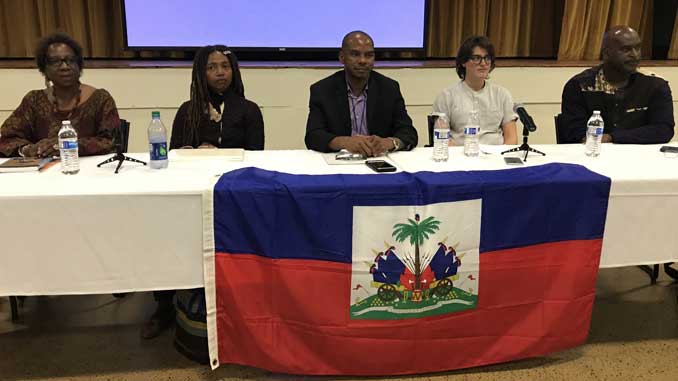
By Naomi Hill
As New Orleans inches closer to marking its 300-year Anniversary, local professionals and activists continue to document and reflect on the rich history of the City. New Orleans is not just a City covered in beignet powder and parade beads, it is also influenced by many countries in its architecture, food, art, music, and dance. But without the pivotal history of Haiti, New Orleans would not be the City that’s known and beloved today.
From Nov. 1st-3rd, over 200 visitors attended the Haitian Studies Association’s 2017 Conference in New Orleans, hosted by Xavier University and Tulane University. The conference’s key plenary on Nov. 3rd, titled “Haiti and New Orleans: Making Cultural Connections in the Local Community,” sought to look at those historic and present-day connections between these two places. The panel reflected on recent examples by groups within the City to reconnect to Haiti.
Freddi Williams Evans, who has written about the History of Congo Square chaired the panel that included Marky Jean-Pierre, a Tulane visiting Professor in Haitian Studies; Monique Moss of Third Eye Theatre Interdisciplinary and Improvisational Performance; Freelance Journalist Laine Kaplan-Levenson who has produced the Tripod New Orleans Tricentennial Series; and Shaka Zulu of New Orleans Voices of Congo Square and Golden Feather Mardi Gras Indians. The panelists spoke about Haiti’s cultural influence on New Orleans, starting from the early arrival of Haitian settlers in the late 1700s, as being fundamental to truly comprehending New Orleans’ culture and people today.
“As I began studying history, I realized parts of Louisiana History that people loved so much, originated before Louisiana was a part of America,” said Chief Shaka Zulu. “So, I began wondering where did that history come from? Where did gumbo come from? Where did the word gumbo come from? So, I continued to study New Orleans… and there was a missing link.”
Zulu said he found those links in simple traditions that have been passed down. The sewing style of the Mardi Gras Indians in New Orleans, Zulu said, could be traced back to similar sewing styles that originated in Haiti.
Other New Orleans’ traditions and customs also can be traced back to the Haitian people, the panelists shared. Some of the crops used in Haiti formed the ingredients needed in well-known New Orleans Creole dishes and delicacies. The sounds of second-line music can also be traced back to Haiti’s rare street parades, Evans said.
“Someone said to me, for a group of enslaved people to successfully up-rise and create an independent country, the rest of the world was like ‘that’s not supposed to happen,’” said Laine Kaplan-Levenson, as she began the process of creating the episode on Haiti for WWNO’s History Podcast Tripod: New Orleans at 300. “So, when that happened, they shut Haiti out as this form of punishment essentially for having freed and liberated themselves and become their own independent island nation and because of that there’s a lot of repercussion,” Kaplan-Levenson said of the History of Haiti after the Haitian Revolution.
The panelists bemoaned the fact that Haitian History is still mostly excluded from U.S. textbooks. The lack of education, they said, is one reason why New Orleanians often don’t recognize their own blood ties to the Caribbean country.
“I did not learn about Haiti in college, until I began taking courses that had to do with that specific subject because one of my professors alluded to Haiti being extremely relevant to the History of New Orleans,” said Monique Moss, who teaches dance at Tulane.
“Then the question becomes for me,” Moss said, “in an event such as the Haitian Revolution, which shifted political dissections, why do we not learn about Haiti?”
Recommended For You.



Be the first to comment